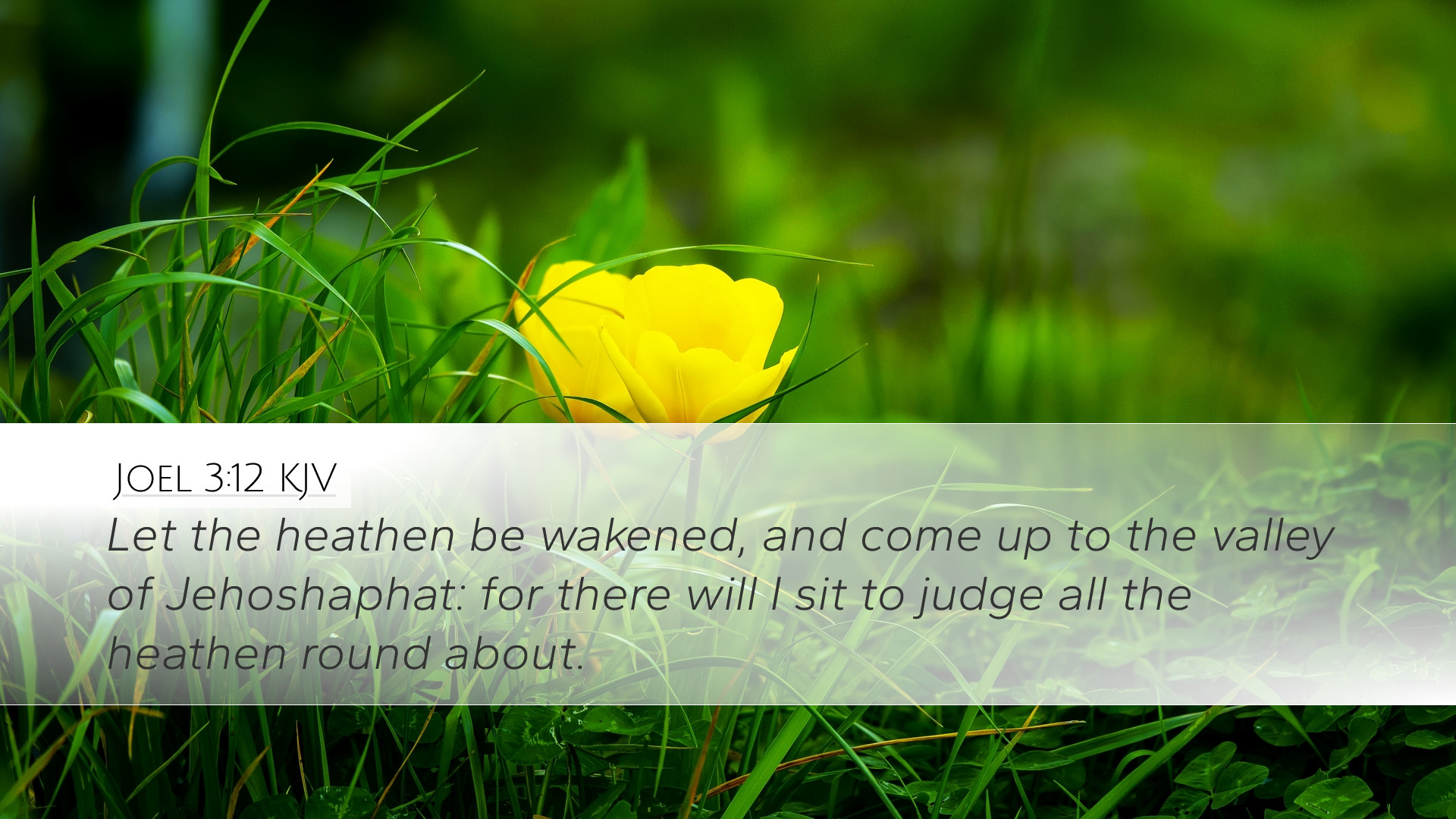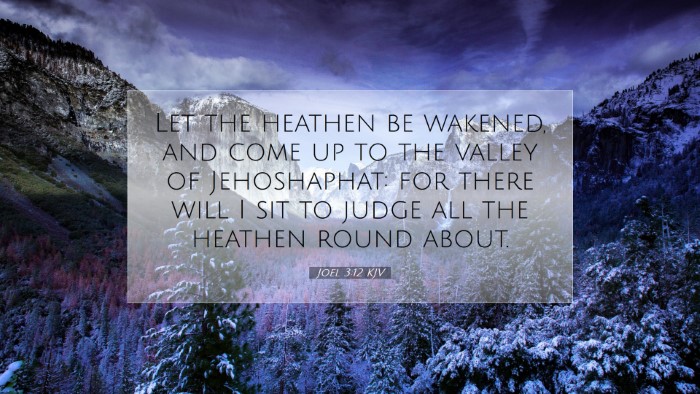Old Testament
Genesis Exodus Leviticus Numbers Deuteronomy Joshua Judges Ruth 1 Samuel 2 Samuel 1 Kings 2 Kings 1 Chronicles 2 Chronicles Ezra Nehemiah Esther Job Psalms Proverbs Ecclesiastes Song of Solomon Isaiah Jeremiah Lamentations Ezekiel Daniel Hosea Joel Amos Obadiah Jonah Micah Nahum Habakkuk Zephaniah Haggai Zechariah MalachiJoel 3:12
Joel 3:12 KJV
Let the heathen be wakened, and come up to the valley of Jehoshaphat: for there will I sit to judge all the heathen round about.
Joel 3:12 Bible Commentary
Commentary on Joel 3:12
Verse: Joel 3:12 (KJV) - "Let the heathen be wakened, and come up to the valley of Jehoshaphat: for there will I sit to judge all the heathen round about."
Introduction
The Book of Joel is distinguished by its profound prophetic insights and urgent calls to repentance. Joel 3:12 presents a critical turning point where God summons nations to face judgment in the valley of Jehoshaphat, a symbolic location for divine adjudication. This commentary draws upon insights from public domain sources, enriching our understanding of the text's theological depth and its implications for faith communities.
Contextual Analysis
Understanding Joel's context is essential for grasping the significance of chapter 3. The prophet Joel speaks in a time of national crisis, characterized by a locust plague perceived as a divine warning. His call for repentance and restoration culminates in a vision of God's judgment against the nations. The "valley of Jehoshaphat" metaphorically represents a place of divine justice where God confronts oppressors and defends His people.
The Call to the Nations
In the phrase "Let the heathen be wakened," we observe a divine summons directed toward the nations. This awakening serves multiple purposes:
- Preparation for Judgment: The call is both a warning and an invitation for the nations to prepare for the impending judgment of God. As Matthew Henry notes, this indicates God's sovereignty over all nations, not just Israel.
- Awareness of Accountability: It suggests that the nations will be held accountable for their actions, echoing the theological principle of divine justice that permeates Scripture.
- God's Inclusivity: This summons emphasizes that God’s judgment will not be limited to Israel but will encompass all nations, illustrating the universal scope of God’s authority over humanity.
The Valley of Jehoshaphat
The term "valley of Jehoshaphat" carries rich imagery laden with hermeneutical significance. Although its precise geographical location is uncertain, it represents:
- Judgment and Justice: Albert Barnes underscores that the valley symbolizes a stage for God's judgment where He evaluates the actions of the nations. It encapsulates the hope of vindication for the oppressed and justice against the oppressors.
- Divine Gathering: Adam Clarke interprets the valley as a metaphorical congregation place for nations before God's tribunal, illustrating the ominous gathering of judgment.
- Historical Reflection: The remembrance of King Jehoshaphat’s victories calls to mind God’s past interventions, reinforcing the notion that God's character remains consistent throughout history.
The Judgment of the Nations
The latter part of the verse declares, "for there will I sit to judge all the heathen round about." This statement encapsulates essential elements regarding God’s judgment:
- Sovereignty of God: This affirmation reveals God's ultimate authority to judge, reaffirming the core belief that true justice originates from the divine.
- Comprehensive Scope: The inclusion of "all the heathen round about" signifies that judgment extends universally, pertinent to all nations that defy God's covenant.
- Prophetic Fulfillment: This prophecy holds both immediate and eschatological significance, as it foreshadows the final judgment described in the New Testament, where all nations will stand before Christ.
Theological Implications
The ramifications of Joel 3:12 stretch beyond the historical audience, presenting enduring themes relevant to contemporary faith communities:
- Call to Repentance: The urgency for repentance remains paramount as the nations are called to self-examination, which echoes the message of the Gospel inviting all to seek redemption.
- Hope for Restoration: Despite the somber tone of judgment, underlying this passage is the hope for restoration for individuals and communities that respond to God's call.
- God’s Justice and Mercy: This tension reflects God's nature, where justice is met with mercy, prompting believers to embody this duality in their engagements with society.
Application for Today's Believers
For pastors, students, and scholars, Joel 3:12 serves as a poignant reminder of the need for awareness, accountability, and action:
- Awareness of Divine Standards: Recognizing that God’s standards apply universally can inspire believers to uphold justice in their communities.
- Active Participation in Justice: Engage in social justice issues as an expression of faith, reflecting God’s heart towards the marginalized and oppressed.
- Encouragement for Evangelism: The call to the nations should provoke a renewed fervor for evangelism, ensuring that all hear the call of God, just as the nations are invited to stand before Him.
Conclusion
The profound implications of Joel 3:12 demand earnest reflection from all who grapple with its message. It serves as a clarion call for nations to awaken, a reminder of God's sovereign authority, and an invitation for individuals to participate in the unfolding narrative of God’s justice and reconciliation. As believers, we are empowered to bear witness to these truths, confident in God’s ultimate judgment and grace.


